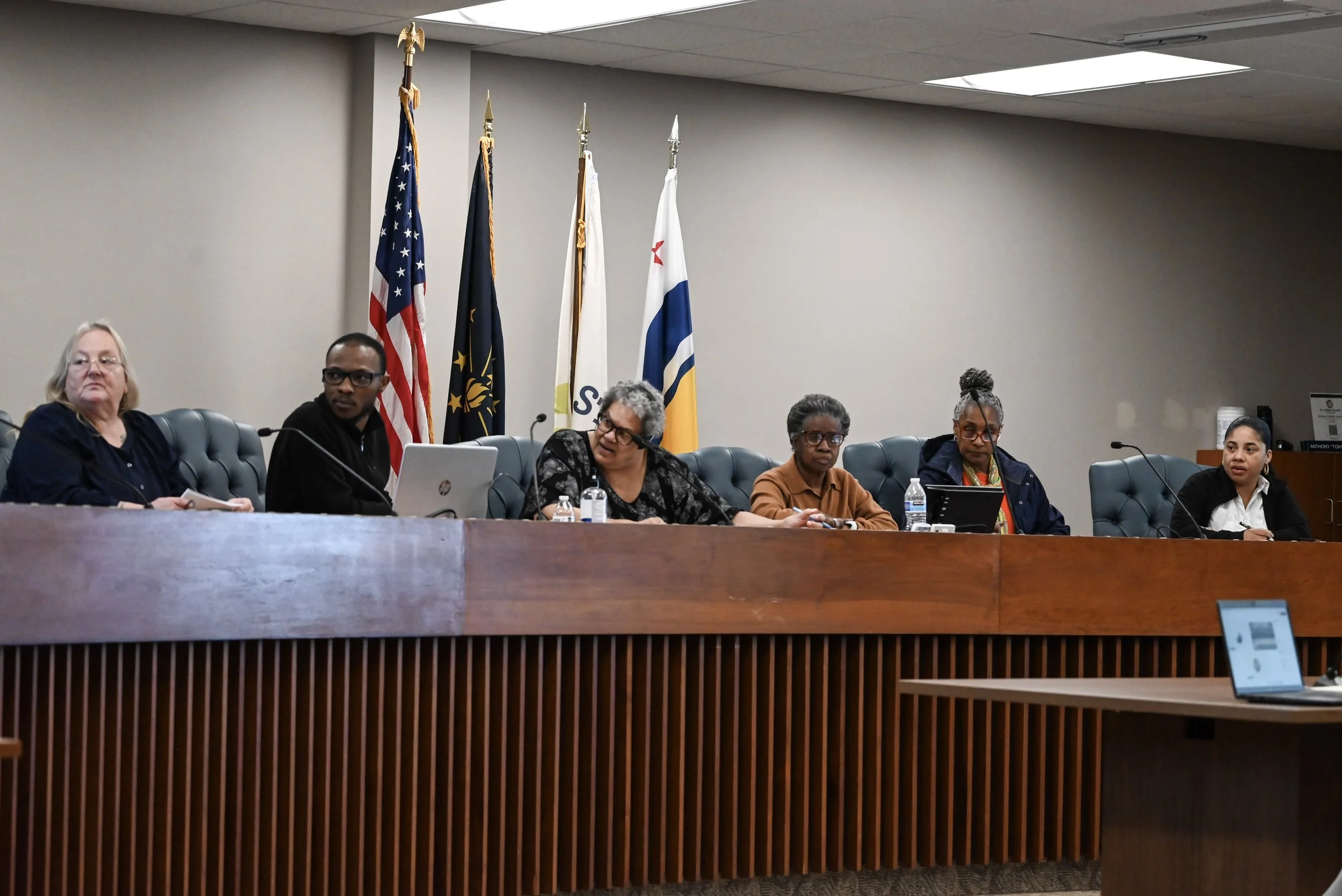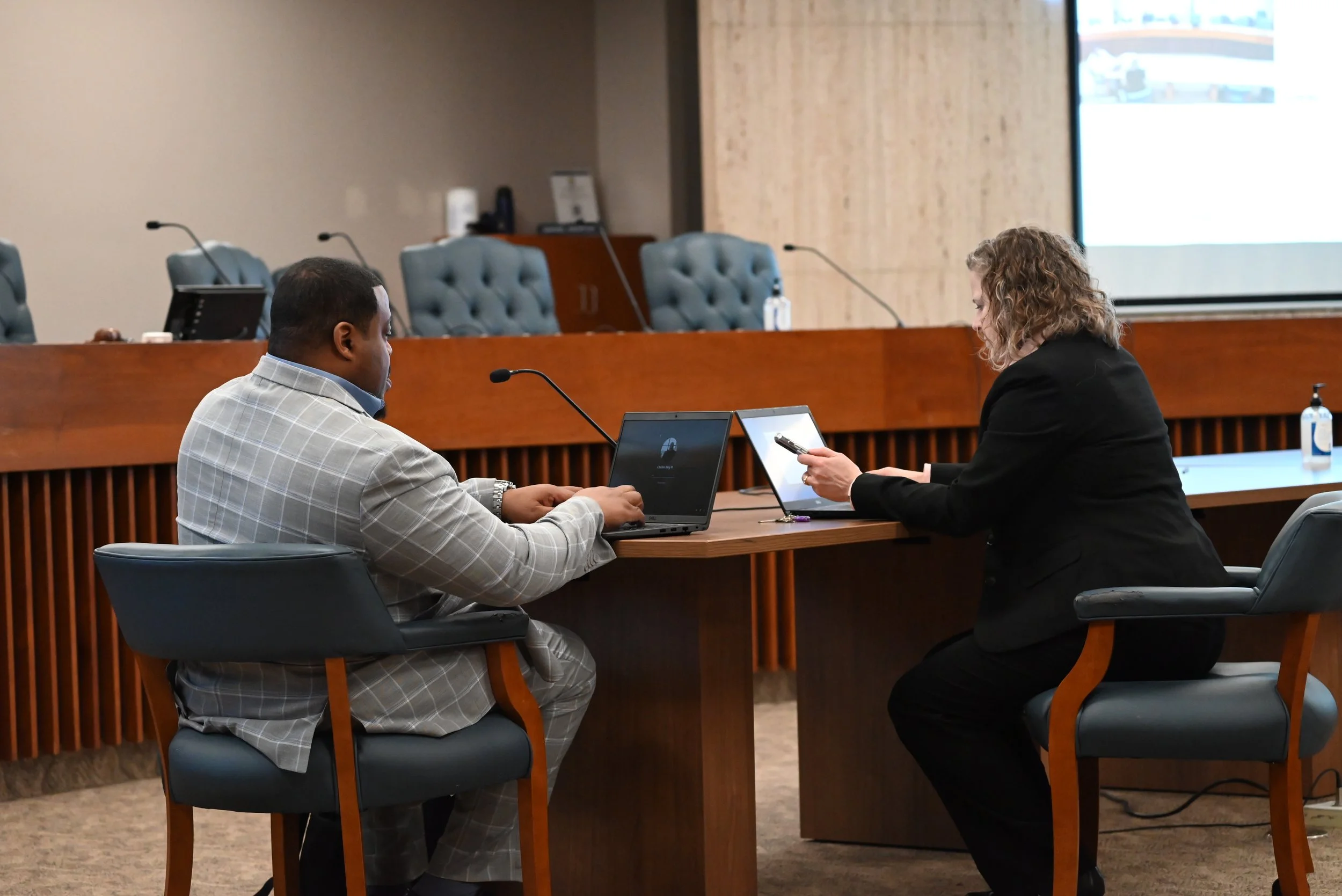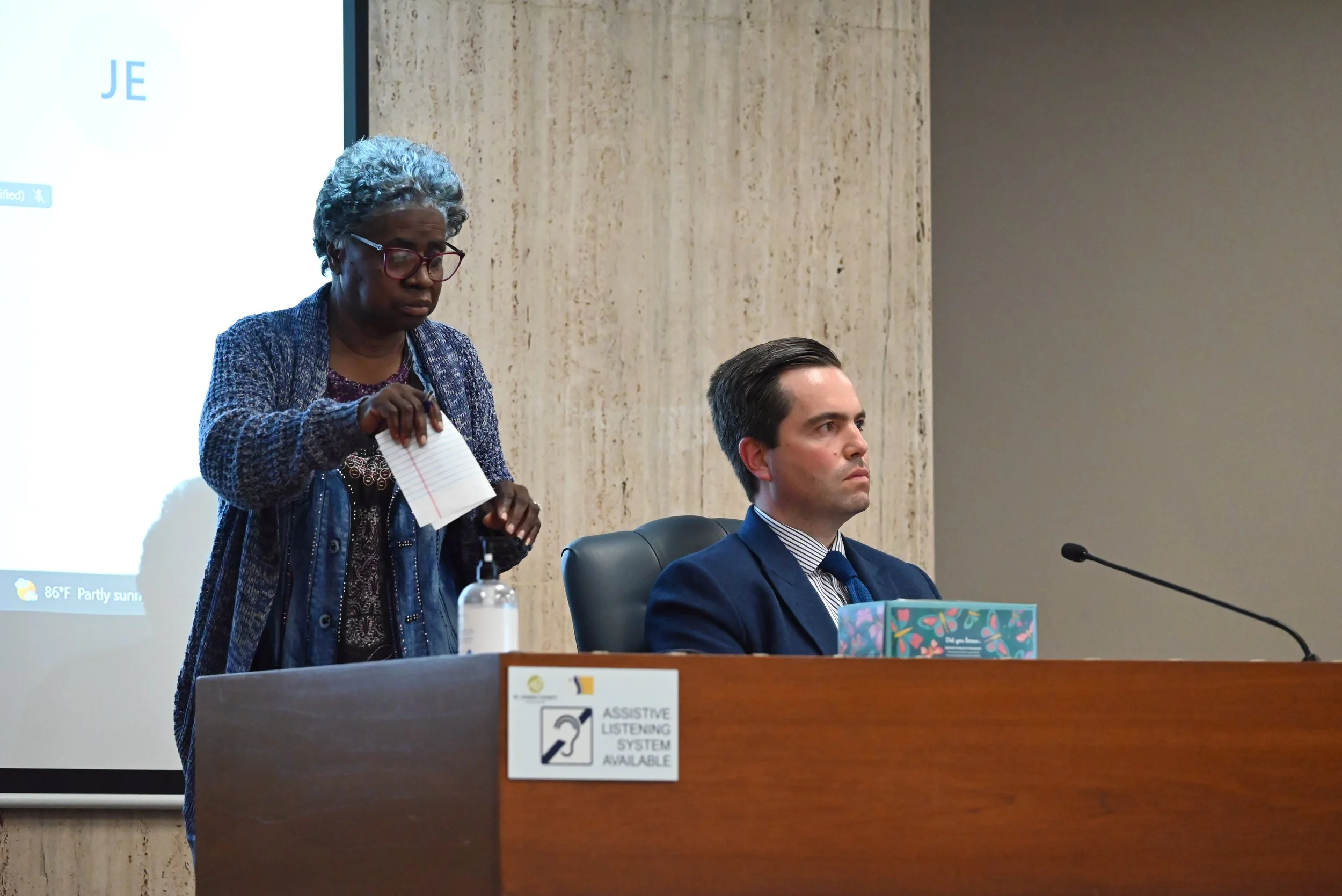All about South Bend’s Community Police Review Board
The South Bend Community Police Review Board passes its bylaws and hears public comment from the South Bend Police Department on March 27, 2025.
What’s the role of South Bend’s Community Police Review Board? Here’s how it operates. Learn more about South Bend’s new board.
How does the Community Police Review Board operate?
If the board disagrees with recommendations by police, it can have King investigate further into the allegations of the complaint, conduct an informal administrative hearing on the complaint or order King to engage in a process of informal mediation to attempt to resolve the complaint, the ordinance says.
These discussions will take place in open sessions. The only information that could potentially be discussed in executive sessions is personal information, such as a person’s social security number or birthdate, King’s attorney, Jessica McLain, said.
The board “gives the community an opportunity for engagement,” Bob Masters, the board's attorney, said. “I think in the best case, it’ll serve as an opportunity for people to be heard, for people to have their concerns addressed, but regardless of the outcome of any particular case, it’s another opportunity for civic engagement.”
Read more.
Pastor Charles King III, director of the Community Police Review Office, and Sandra Kennedy, corporation counsel for the city of South Bend, sit at the March 20, 2025, Community Police Review Board meeting.
What are the duties of the board?
Duties of the review office include:
● Receive, review and assess complaints about South Bend Police officers
● Make South Bend Police's Internal Affairs aware of the complaint within 24 hours and conduct a parallel investigation. The proposed policy would allow review office investigators to gather witness statements, body-worn camera footage, police reports, and physical evidence.
● Present investigation findings to the Community Police Review Board. “We don’t really have any vote on it, but we bring it to the board, along with any information provided by Internal Affairs and it is up to the board to adjudicate and make a determination,” King said.
The Review Board, consisting of nine members elected by the South Bend Common Council, will review the allegations in each complaint and decide if they agree or disagree with the findings of the investigation conducted by the police department’s internal affairs. The board will have five options to classify a complaint: sustained, not sustained, exonerated, withdrawn or mediation ordered.
Read more.
Police disagreements with the board’s bylaws.
Arguments from the South Bend Police Department’s attorney Kylie Connell included:
The board should have to abide by the city’s ethics policy as passed by the Common Council.
Records should be maintained by the review office, not the board’s secretary, for confidentiality procedures. “It’s very important that records are not shared with the public when they should not be shared with the public,” she said. "That should be in a bylaw."
Confidentiality should include a code section stating that an officer’s alleged misconduct is not for public access and personal information. She argued against use of names, addresses, dates, phone numbers — anything that would give the public enough information to ask for records of alleged police misconduct.
Subpoenas should be discussed only away from the public in executive session so they would not be part of the public record because of any ongoing investigation.
Read more.
South Bend Community Police Review Board member Cheryl Ashe stands before a screen to view suggestions to the board's bylaws by the South Bend Police Department on March 27, 2025.
Board hears complaints against officers but are given ‘little evidence’
After hearing investigative findings about four complaints members of the public filed against South Bend police officers, Community Police Review Board members found their own decisions limited by their lack of access to evidence.
During its first May meeting, the South Bend Community Police Review Board heard information from four complaints filed in 2024. No personal or identifying information of officers or complainants was shared. In fact, members can hear only a summary of the complaint, what the SBPD Internal Affairs decided about the complaint, and whether Community Police Review Director Charles King III agreed with Internal Affairs.
King, who aside from being director of the police review office is its only current investigator, conducted several investigations — concurrent with the police department’s Internal Affairs — through viewing officer body camera footage, speaking with the complainant, speaking with witnesses and viewing Ring camera footage.
Read more.
Who’s on the board and what are their term lengths?
● Sherria Williams, 1st District, nominated by 1st District councilor Canneth Lee: three-year term
● Komonique Thomas, 2nd District, nominated by 2nd District councilor Ophelia Gooden-Rodgers: three-year term
● Kelly Johnson, 3rd District, nominated by 3rd District councilor Sharon McBride: two-year term
● LuElla Webster, 4th District, nominated by 4th District councilor Troy Warner: two-year term
● Roxanne Hughes, 5th District, nominated by 5th District councilor Sherry Bolden-Simpson: two-year term. Hughes replaced Dennis James Givens, who has not attended board meetings.
● Donna McMahon, 6th District, nominated by 6th District councilor Sheila Niezgodski: one-year term. McMahon replaced Clara Davis, who has not attended board meetings, in March.
● Joseph Adams, 5th District, nominated by At-Large councilor Karen White: one-year term. Adams currently serves as the board's president.
● Cheryl Ashe, 5th District, nominated by At-Large councilor Rachel Tomas Morgan: three-year term
● Dé Bryant, nominated by At-Large councilor Oliver Davis Jr. is a one-year term.
Read more.
LuElla Webster, member of the South Bend Community Police Review Board, submits her ballot vote to the board's attorney Bob Masters at its May 15, 2025 meeting.
South Bend police review board takes secret vote against attorney's advice, Indiana law
At the board's May 15, meeting, Board President Joseph Adams asked if any members had any concerns, to which member Donna McMahon inquired if votes could be done secretly.
“I feel that our votes should be among us board members only because I worry about people retaliating,” McMahon said. “When it’s published in the newspaper, who votes no and who votes yes, there is that chance that either or either way there could lead to some type of retaliation.”
McMahon was concerned because The Tribune reported on the May 1 meeting and published which board members voted in agreement or disagreement with the Internal Affairs’ and the review office’s decision in four civilian complaints. Director King agreed with the police department that officers acted appropriately in all four cases. The board agreed on two cases but couldn't reach an agreement on the other two.
After approving a vote to discuss McMahon’s concerns, the board yielded to its attorney Bob Masters, who told the board that as a public body conducting public business they must adhere to Indiana's Open Door Law, requiring that “the final actions of a public body be public” and that a secret ballot would violate state law.
Read more.
Resident files complaint with board after officer use of force on 14-year-old girl.
King’s office conducts investigations along with the department’s Internal Affairs to draw a conclusion based on the findings, deciding whether the officer is exonerated of the claims against them or if their actions did violate a department policy. The review board then votes on whether it agrees with the findings of King and the Internal Affairs department.
The board does not view body camera footage or conduct its own investigation.
Tiana Batiste-Wadell, who is executive director of family advocacy group Jax Aspire Foundation, called into question whether King being employed by the city gives him a conflict of interest in conducting his investigations.
Read more.
Board hears resident complaints of officer force on 14-year-old girl
The review board meeting started 10 minutes late, with President Joseph Adams asking for a moment of silence in consideration for the “recent violence that our city has experienced.” Over the weekend of Aug. 15-17, an 8-year-old girl and 12-year-old boy were injured in separate shootings.
Wayne Hubbard — a South Bend father of nine — was upset by videos circulating in the community of South Bend police Officer Samuel Chaput taking a 14-year-old girl to the ground after she left the McDonald's, where she'd been involved in a dispute over her request for a refund for food she said had been prepared in an unsanitary manner.
Hubbard called on the police department to “hold themselves to the standards of the criminals they claim to pursue,” he said. Three of Hubbard’s children attended the protest and public meeting with him.
“They cannot try to compare violence among Black youth — or youth period — with them assaulting our youth,” Hubbard said at the protest.
Read more.



